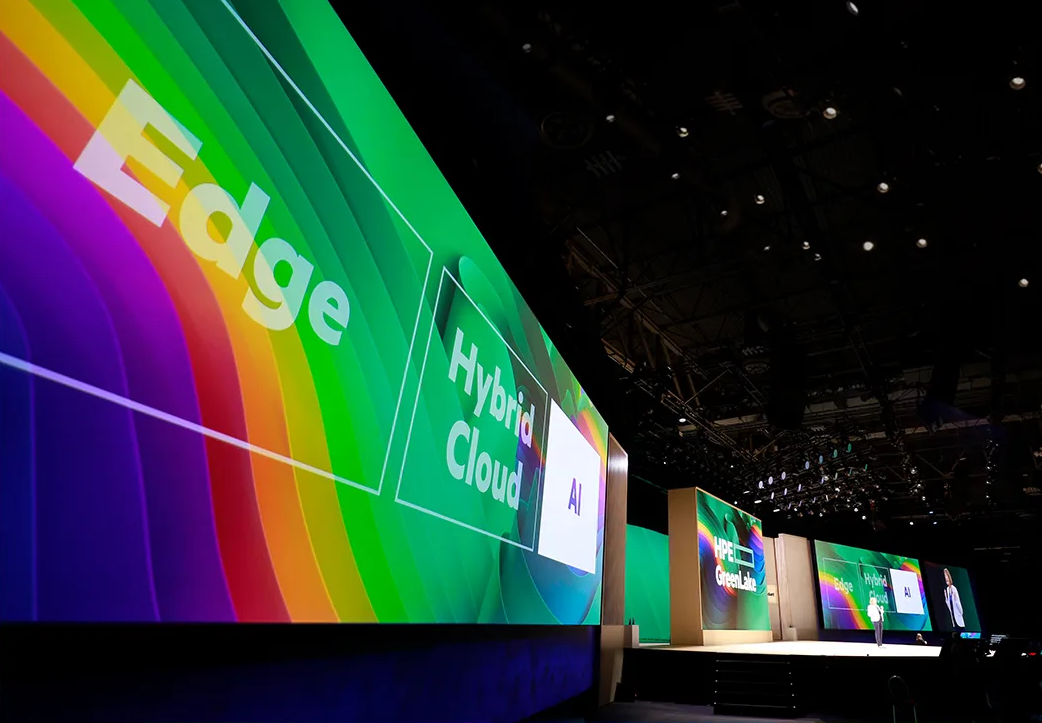News in Cloud Computing & Data Storage
Data Centre Build News & Insights
Data Centre Operations: Optimising Infrastructure for Performance and Reliability
Data Centre Projects: Infrastructure Builds, Innovations & Updates
News
News in Cloud Computing & Data Storage
Nationwide migrates IT estate to HPE GreenLake cloud
Hewlett Packard Enterprise today announced that Nationwide Building Society has selected HPE GreenLake cloud for its private cloud deployment, enabling it to accelerate its hybrid cloud journey. With the addition of HPE GreenLake Management Services as a strategic cloud services provider, Nationwide is now using the power of cloud technology to support the evolving needs of its customers.
In 2018, Nationwide kick-started an ambitious journey to ensure it was primed for the next generation of digital innovation, with its hybrid cloud strategy being driven by the need for different cloud environments for various types of data and workloads. Leveraging the comprehensive capabilities of HPE GreenLake, Nationwide is creating an agile, scalable, secure, resilient, and efficient technology platform.
“In today’s world our customers expect us to deliver an always-on service whilst providing new, innovative features that help them better manage their finances,” says Paul Walsh, Director of Infrastructure & Service Delivery, at Nationwide Building Society. “Nationwide’s hybrid cloud strategy is vital to our ability to compete and means we can continue to meet the needs and expectations of our customers. HPE GreenLake cloud is a core component of our hybrid cloud strategy. With them we’re building a cloud platform that will further improve our resilience and agility, enabling us to provide even better levels of service and deliver new capabilities to our developers faster than ever before.”
With HPE GreenLake Management Services, Nationwide’s IT team will automate and orchestrate infrastructure management and deliver infrastructure as code. This enables them to focus on innovation, value-add activities and gain better control over application builds and security. Faster release cycles will accelerate the time to market, providing consistent customer experiences across all digital platforms. At the same time, Nationwide can ensure that sufficient controls are in place to manage risk, protect their customers and meet the demands of regulators, while unlocking the value of cloud technology.
Nationwide’s hybrid cloud strategy fully embraces cloud economics, enabling efficient monitoring and management of consumption. HPE GreenLake's consumption-based model prevents overprovisioning and allows Nationwide to only pay for capacity that it is using. This is expected to support Nationwide in reducing its IT cost base by at least 30%.
Furthermore, a dedicated service within HPE GreenLake cloud gives the building society a clear overview of their energy consumption and emissions, enabling Nationwide to manage its infrastructure more efficiently and reduce the environmental impact. The impact will be further reduced by upcycling and recycling of decommissioned assets, such as the end-of-use compute and storage infrastructure that GreenLake has replaced.
“We are proud to support Nationwide with their cloud vision, providing them with enhanced control and security and the reliability and flexibility for growth,” says Matt Harris, Senior Vice President and Managing Director, UK, Ireland, Middle East and Africa at HPE. “Nationwide’s modernisation journey showcases the effectiveness of HPE GreenLake cloud, with the storied institution transitioning from complex, legacy technology to a modern, future-proofed hybrid cloud operating model, where a one-size-fits all public cloud could never be the only answer."
For more from HPE, click here.
Simon Rowley - 19 November 2024
Data Centre Operations: Optimising Infrastructure for Performance and Reliability
Enterprise Network Infrastructure: Design, Performance & Security
News
News in Cloud Computing & Data Storage
CtrlS Datacenters announces direct access to Oracle Cloud
CtrlS Datacenters, Asia’s largest Rated-4 data centre operator and a member of Oracle PartnerNetwork (OPN), today announced it will offer its customers direct high-speed connectivity to Oracle’s cloud and AI services through Oracle Cloud Infrastructure (OCI) FastConnect.
Organisations can harness the power of AI and a full suite of over 150 cloud services, including Oracle Autonomous Database, using the Oracle Cloud Mumbai Region and the Oracle Cloud Hyderabad Region to unlock innovation and drive business growth.
Through dedicated 2x100G Partner ports, CtrlS Datacenters offers customers both shared and dedicated access to OCI FastConnect. This enables organisations to:
• Reduce latency and improve performance: experience faster data transfer, minimising lags and disruptions for optimal application performance• Enhance security: dedicated network paths and robust encryption help ensure secure migration and management of workloads in OCI• Increase agility and scalability: scale cloud resources to support evolving business needs, fostering greater flexibility and adaptability
This collaboration with Oracle is designed to empower organisations in key markets, such as Hyderabad and Mumbai, to access OCI services with enhanced speed, security, and reliability. Customers across all CtrlS data centres will be able to get the OCI FastConnect nodes in Hyderabad and Mumbai.
With OCI, customers can benefit from best-in-class security, consistent high-performance, simple and predictable pricing, and the tools and expertise needed to bring enterprise workloads to cloud quickly and efficiently.
Beyond Mumbai and Hyderabad, enterprise customers of CtrlS Datacenters across all markets (Bangalore, Noida, Lucknow, and Patna) can benefit from OCI FastConnect through their Cloud Connect portfolio. Chennai and Kolkata will follow soon. This solution leverages diverse connectivity options to deliver secure and reliable access to OCI, regardless of physical location.
Sridhar Pinnapureddy, Founder & Chairman, CtrlS Datacenters & Cloud4C, comments, "Our unwavering commitment lies in being a market leader, not just in Rated-4 data centres, but also in building a comprehensive interconnection ecosystem that empowers businesses across India. Partnering with Oracle to provide direct access connectivity options to OCI marks a significant step towards this vision.
“It's not just about offering services; it's about equipping organisations with the agility and security they need to thrive in the cloud-driven era. This expansion reinforces our dedication to bridging the gap between ambition and achievement, propelling organisations toward a brighter future."
OCI’s extensive network of more than 100 FastConnect global and regional partners offers customers dedicated connectivity to Oracle Cloud regions, providing customers with optimal cloud deployment options anywhere in the world.
For more from CtrlS Datacenters, click here.
Simon Rowley - 12 November 2024
Data Centre Operations: Optimising Infrastructure for Performance and Reliability
News
News in Cloud Computing & Data Storage
Tata unveils AI infrastructure with NVIDIA accelerated computing
Tata Communications today announced a transformative upgrade to its AI cloud infrastructure in India, powered by NVIDIA Hopper GPUs.
The company says that the strategic collaboration marks a significant milestone in the country’s AI journey, and that it positions Tata Communications as a key player in enabling AI applications across a wide spectrum of industries - including manufacturing, healthcare, retail, and banking and financial services - and equipping them with the computing power needed to handle complex AI workloads.
As part of the initiative, Tata Communications will integrate cutting-edge NVIDIA software solutions such as NVIDIA NIM microservices, and the NVIDIA Omniverse and NVIDIA Isaac platforms, into its AI Cloud offerings. These technologies will provide businesses with an extensive suite of tools and services designed for AI-driven simulation, automation and more.
At the end of this year, Tata Communications will begin the first phase of its large-scale deployment of Hopper GPUs, establishing itself as one of the largest NVIDIA Hopper GPU cloud-based supercomputers in India. The second phase, planned for 2025, will further expand the infrastructure with Blackwell GPUs.
Tata Communications is poised to disrupt the AI landscape with an AI studio, a ground-breaking, all-in-one platform designed to transform how businesses use AI, by offering tools like AI Workbench, Model Garden, Responsible AI and serverless functions.
Furthermore, its advanced tools will simplify distributed data management, allowing businesses to efficiently collect and curate data across various enterprise systems and move it to the AI Cloud using Tata Communications' IZO Multi Cloud Connect platform. This approach will ensure cost-effectiveness and scalability for enterprises, while maintaining their existing data structures.
Complementing this is Tata Communications' CloudLyte Edge Computing platform, which enables low-latency inferencing, allowing businesses to deploy models at the edge for real-time responses. Together, these innovations empower enterprises to fully harness the power of AI.
“AI is expanding the boundaries of innovation and revolutionising business in ways we could never have imagined,” says AS Lakshminarayanan, MD & CEO, Tata Communications. “Therefore, every entity must prioritise AI integration to stay competitive. We are delighted to partner with NVIDIA to build a unique and transformative Cloud Fabric that will empower a generation of Indian innovators and entrepreneurs, fostering a vibrant AI ecosystem and propelling the nation towards a future fuelled by AI.”
Providing enterprises with a powerful infrastructure capable of handling complex AI workloads will help drive AI adoption across India. Combining NVIDIA’s AI platform with TATA Communications’ global network, will create a national supercomputing framework, driving innovation and helping elevate India’s role in the global AI player ranks.
“Tata Communications’ AI cloud infrastructure, integrating NVIDIA accelerated computing, will support businesses of all sizes - from AI startups to large enterprises - helping drive AI transformation across various sectors of the Indian economy and creating a powerful ecosystem for AI innovation,” adds Jay Puri, Executive Vice President of Worldwide Field Operations at NVIDIA.
Tata Communications customers will also gain access to the NVIDIA AI Enterprise software platform on its accelerated infrastructure, which is designed to let users build, customise and run generative and agentic AI applications in production. This includes NVIDIA NIM Agent Blueprints, which provide customisable reference architectures for use cases like digital human technologies or AI virtual assistants for customer service, multimodal PDF extraction workflows for enterprise data retrieval and container security workflows for cyber security.
Enterprises can also create their own AI models using the NVIDIA NeMo end-to-end platform for developing custom generative AI, and run efficient AI inference through NVIDIA’s NIM microservices - both part of the NVIDIA AI Enterprise - offering unparalleled flexibility and performance for AI workloads.
By integrating NVIDIA technologies, Tata Communications will continue to demonstrate its commitment to building next-generation AI infrastructure and services, positioning the company to lead India’s AI transformation and make AI more accessible across industries.
For more from Tata Communications, click here.
Simon Rowley - 24 October 2024
Data Centre Operations: Optimising Infrastructure for Performance and Reliability
Enterprise Network Infrastructure: Design, Performance & Security
News
News in Cloud Computing & Data Storage
CMC Networks rolls out platform in Africa and Middle East
CMC Networks, a global Tier 1 service provider, has rolled out its CMC Fusion networking platform across 51 African and 11 Middle Eastern countries. It will enable carriers, service providers and enterprises to provision and manage network services across these regions from anywhere in the world, simplifying business growth across dynamic markets.
CMC Fusion is a cloud-based platform that consolidates multiple network services and analytics into a single portal and marketplace, including MPLS, Carrier Ethernet, Dedicated Internet Access (DIA), multi-cloud connect, software-defined wide-area networking (SD-WAN), service monitoring, assurance, security, management, and more. The easy-to-use portal is built on the largest application-aware, AI-enabled and software-defined network (SDN) in Africa. It is aligned with global industry standards to ensure interoperability and provide support with regulatory compliance.
“CMC Fusion is transforming what was once a complex, costly and fragmented market into one unified networking ecosystem,” says Marisa Trisolino, CEO at CMC Networks. “The company is developing a platform that is making it easier than ever to do business across Africa and the Middle East.”
CMC Fusion enables seamless, consistent performance and application experience for customers connecting across multiple countries and clouds in Africa and the Middle East. It provides a consolidated view of all information and analytics, making it easy for customers to track their orders, tickets, and services. Round-the-clock network monitoring enables fast identification and troubleshooting of any potential problems. Carriers, service providers and enterprises can move with greater agility to connect and capture new growth opportunities across multiple markets.
Geoff Dornan, CTO at CMC Networks, adds, “In an increasingly cloud-centric world, CMC Networks is removing the borders and barriers to growth in Africa and the Middle East and innovating to directly address on-the-ground challenges where the company operates. CMC Networks is looking forward to making it even easier for its customers to grow their businesses across these regions.”
CMC Cloud is one of the many solutions available through CMC Fusion, delivering high-performance edge computing across Africa. The Infrastructure as a Service (IaaS) solution is designed to bring workloads closer to the end user and improve the performance of applications and services, without the need to invest in physical hardware. CMC Networks has the largest pan-African network servicing 51 out of 54 countries in Africa and 11 countries in the Middle East, plus regional hubs in key interconnect locations across Europe, the Americas and Asia Pacific.
For more from CMC Networks, click here.
Simon Rowley - 9 October 2024
Data Centre Operations: Optimising Infrastructure for Performance and Reliability
Enterprise Network Infrastructure: Design, Performance & Security
News in Cloud Computing & Data Storage
Nasuni integrates Microsoft 365 Copilot
Nasuni, an enterprise data platform for hybrid cloud environments, has announced its latest advancement in data intelligence by further integrating with Microsoft 365 Copilot. Through the Microsoft Graph Connector, Nasuni managed data is now fully accessible and operational with Microsoft Search and Microsoft 365 Copilot, significantly expanding data access for Microsoft's AI services.
AI requires AI-ready infrastructure, and today's legacy data storage infrastructure creates a challenge for forward-thinking enterprises. Legacy hardware-based storage generates silos of data, making it impossible to run AI and analytics against. Organisations, which can have billions of files and petabytes of data, need to break down these silos and consolidate their data into the cloud. The power to unlock this data is incredible, which is why the Nasuni File Data Platform enables this through data consolidation, protection and accessibility for anyone and anything (including AI).
The Graph Connector enables organisations to leverage Nasuni’s managed data repositories to harness the full potential of Microsoft 365 Copilot, aligning AI-powered experiences with specific business needs and workflows. Organisations can use the Graph Connector to leverage Nasuni data with Microsoft 365 semantic index to unlock AI-powered search, enhanced compliance, and advanced analytics through a unified interface.
Key benefits of this integration include:
· Unlocking greater value from data: Customers can now maximise the value of their Nasuni-managed data by making it accessible for personalised experiences via Microsoft 365 Copilot and Microsoft Search, enriching user interactions with relevant content.
· AI-powered search and insights: The Graph Connector enables Nasuni-managed files to be indexed into Microsoft's semantic index, which forms a key part of the Microsoft 365 AI infrastructure. This semantic index is utilised by Microsoft 365 Copilot and Microsoft Search to provide contextually relevant answers and insights across Microsoft 365 applications.
· A unified data interface: Customers benefit from single-pane-of-glass access to their Microsoft 365 data (including SharePoint and OneDrive) and Nasuni. This unified view allows for efficient searching and interaction with documents across the entire unstructured file stack, inclusive of Nasuni-managed data.
"By enabling Microsoft 365 Copilot through the use of the Microsoft Graph Connector, we're empowering our customers to get even more value out of their Nasuni-managed data," says Jim Liddle, Chief Innovation Officer of Data Intelligence and AI at Nasuni. "This solution integration will make it frictionless to use Microsoft 365 Copilot with Nasuni data in context with Microsoft 365 stored data sets, allowing for more informed decision-making and improved efficiency in our customers' day-to-day operations."
For more from Nasuni, click here.
Carly Weller - 25 September 2024
Data Centre Operations: Optimising Infrastructure for Performance and Reliability
Enterprise Network Infrastructure: Design, Performance & Security
News
News in Cloud Computing & Data Storage
VIAVI introduces VAMOS automation platform
VIAVI Solutions has introduced the VIAVI Automation Management and Orchestration System (VAMOS), an intelligent automation platform that incorporates AI/ML capabilities to enable wireless and cloud service providers, network equipment manufacturers and their ecosystems to reduce operational expenses and accelerate time-to-market.
The complexity of network architectures continues to increase, as operators and equipment manufacturers investigate the next generation of technology, migrate to the cloud, and leverage AI and ML. Continuous Testing (CT) becomes ever more prevalent to provide a unifying perspective on real-world performance. However, labs are confronting the dual challenges of more tests and limited headcount. Automation has become a crucial way for them to manage the complexity, scheduling and manpower demands of CT, allowing technicians to efficiently power through hundreds of test cases, and to focus on higher-order analysis and problem solving.
VIAVI has developed VAMOS as part of its NITRO Wireless portfolio to automate test campaigns and their execution in one centralised cloud-based, Lab-as-a-Service platform. Built-in AI and ML capabilities enable test optimisation and faster response times.
VAMOS’s customisable workspaces and configurations streamline the testing process across organisations and lab locations. Shared tool testbeds and individual sandboxes accommodate multiple test needs while the platform’s robust analytics and reporting help maximise test resource utilisation and boost test accuracy.
“As VIAVI works with leading labs around the globe to integrate wireless, cloud and AI, the need for automation and orchestration has never been clearer,” says Ian Langley, Senior Vice President, Wireless Business Unit, VIAVI. “In initial implementations at major labs, VAMOS has already demonstrated significant reductions in cost per test-hour and increases in hardware utilisation.”
In addition to providing a standalone solution to schedule and run test campaigns based on VIAVI’s NITRO Wireless portfolio, VAMOS can be integrated with a third-party automation framework, allowing it to interact with a wider range of products and existing test environments. Connection is available via both software and hardware.
VAMOS will be integrated into the VIAVI Automated Lab-as-a-Service for Open RAN (VALOR) for the lab’s on-demand, cloud-based testing. VALOR is designed to manage and support 5G and Open RAN deployments that would benefit from access to tools and expert staff with a minimal ramp-up time. The project is funded by the Public Wireless Supply Chain Innovation Fund.
For more from VIAVI Solutions, click here.
Simon Rowley - 16 September 2024
Data Centre Operations: Optimising Infrastructure for Performance and Reliability
Data Centres
Enterprise Network Infrastructure: Design, Performance & Security
News in Cloud Computing & Data Storage
Juniper revolutionises data centre assurance
Juniper Networks has announced several new and unique enhancements to its data centre assurance capabilities, driving exceptional user experiences through increased network visibility, analysis and automation.
The Juniper data centre networking solution now incorporates new cloud-hosted services that leverage AI for networking to deliver enhanced insights into application behaviours, both traditional and emerging AI workloads, for ongoing optimisation and rapid troubleshooting. In addition, Juniper has added new capabilities for analysing and validating data centre operations plus even richer telemetry data which, alongside other data centre assurance capabilities, help to reduce deployment times by up to 85% and cut OPEX costs by up to 90% in some instances.
Juniper’s data centre networking solution consists of QFX Series Switches, EX Series Switches, PTX Series Routers, ACX Series Routers and high performance SRX Series Firewalls managed via Juniper Apstra data centre assurance software and the Marvis Virtual Network Assistant (VNA). As a key part of the Juniper AI-Native Networking Platform, the solution leverages the right data to deliver the right real-time responses for highly reliable data centre networking. This enables unique capabilities, such as multivendor intent-based networking and switch management, proactive AIOps and a GenAI conversational interface for knowledgebase queries. From traditional data centres to new data centres for AI training, inference and storage clusters, Juniper combines exceptional performance with best-in-class flexibility and operational simplicity, plus switch management, proactive AIOps and a GenAI conversational interface for knowledgebase queries.
To simplify data centre operations and maximise network performance even further, Juniper has added new and unique software enhancements, which include:
New AI-Native cloud services that improve application visibility and assurance to optimise performance and lower mean-time-to-resolution (MTTR) Juniper is launching two new data centre cloud services, Service Awareness and Impact Analysis, to complement the Marvis VNA for Data Center AI-Native cloud service announced earlier this year.
Service Awareness leverages AIOps to add application and service data to the Juniper network knowledge graph, enabling greater application-to-network visibility. Service Awareness increases the understanding of where apps and services attach, how they communicate across the network, and what resources they consume, providing direct insights and supporting additional assurance capabilities such as Impact Analysis.
Impact Analysis builds on Service Awareness to enable faster troubleshooting and issue resolution and improved application assurance. AI/ML maps identified issues to impacts, providing a clear picture of which issues are responsible for applicationimpacts and which are unrelated. State comparison between different times improves identification and resolution of transient issues.
Service Awareness and Impact Analysis are now available in the Juniper Apstra Premium license tier at no extra charge. Marvis VNA for Data Center, the initial application in the Juniper Apstra Cloud Services suite, continues to be available in all three Juniper Apstra license tiers (Standard, Advanced, Premium) at no extra charge. All three data centre cloud services are built on Juniper’s microservices cloud architecture, which maximises scale, resiliency and performance.
Continued investment in intent-based networking improves the operator experience and further optimises application performance. The latest release of Juniper Apstra (version 5.0), which is a seamless upgrade for current users, builds on this leadership by adding over 100 new features focused on simplifying data centre operations even further.
For more from Juniper, click here.
Carly Weller - 12 September 2024
Data Centre Operations: Optimising Infrastructure for Performance and Reliability
Data Centres
Enterprise Network Infrastructure: Design, Performance & Security
News in Cloud Computing & Data Storage
Vertiv launches cloud-based fleet management
As AI workloads pivot to the network edge, the need for enhanced visibility at these remote data centre sites has become increasingly apparent. Recognising this, Vertiv has introduced Vertiv Environet Connect, a cloud-connected and web-based fleet management and monitoring solution. It features a device-agnostic interface that can handle diverse data centre infrastructure equipment across multiple locations, regardless of the manufacturer. Environet Connect is now available in Europe, Middle East and Africa (EMEA) and in North America.
Environet Connect speeds the deployment of remote Vertiv equipment and improves its health and efficiency through mass provisioning and firmware updates of network management cards. The system's monitoring capability enhances the oversight of critical infrastructure and provides customisable and configurable alarm notifications. Monitoring covers UPS systems, rack power distribution units (PDUs), generators, and thermal units.
"Edge deployments are growing rapidly and may soon be driven by real-world AI applications such as large language models, predictive analytics, and autonomous vehicles. Although these applications currently operate in data centres, they may quickly shift to the edge to reduce latency and avoid processing bottlenecks," says Wesley Lim, vice president of software and digital solutions for Vertiv. "Implementing a secure, user-friendly and web-accessible monitoring solution like Environet Connect would enhance operational visibility and maximise uptime for remote environments."
Environet Connect is accessible to direct customers and channel-managed service provider (MSP) partners. It accommodates all user types and is designed for multi-tenancy, simplifying the process for partners and customers.
Vertiv offers a series of services to enhance the Environet Connect user experience, with software training, customer help desk and asset management. The services include tiered levels, encompassing technical support, firmware updates, device provisioning and remote monitoring.
Vertiv recently announced its end-to-end portfolio for High-Performance Compute (HPC) and AI deployments, Vertiv 360AI. The solutions include power, cooling, enclosures, end-to-end lifecycle services and digitised management. Vertiv Environet Connect allows a common interface for the solutions within the AI ecosystem.
For more from Vertiv, click here.
Carly Weller - 10 September 2024
Data
Data Centre Operations: Optimising Infrastructure for Performance and Reliability
Enterprise Network Infrastructure: Design, Performance & Security
News
News in Cloud Computing & Data Storage
NetApp optimises VMware environments with new capabilities
NetApp, an intelligent data infrastructure company, has announced new capabilities that support VMware Cloud Foundation deployments. Mutual customers will be able to leverage NetApp solutions to right-size their IT environments to run VMware workloads at scale efficiently.
For more than a decade, NetApp and VMware have collaborated to ensure the success of their joint customers and to help them unlock the full value of their VMware investments. During that time, NetApp has been a key engineering design partner with VMware and is continuing to drive innovation in highly available, scalable and performant storage as a design partner for its Next-Generation vSphere Virtual Volumes (vVols). Now, NetApp is announcing new capabilities that will enable joint customers to run their VMware deployments more efficiently.
“NetApp and Broadcom are working together to take the uncertainty out of hybrid cloud environments,” explains Jonsi Stefansson, Senior Vice President and Chief Technology Officer at NetApp. “More than 20,000 customers rely on NetApp to support their VMware workloads. NetApp's continued close collaboration with Broadcom following the acquisition of VMware ensures our solutions seamlessly interoperate so our mutual customers can leverage a single intelligent data infrastructure to operate their VMware workloads more efficiently.”
NetApp is helping to optimise costs, simplify operations, and increase flexibility for customers running VMware environments by offering:
• Expanded support for VMware Cloud Foundation (VCF): NetApp and Broadcom customers will now be able to simplify their VCF hybrid cloud environments by using NetApp ONTAP software for all storage requirements, including standard and consolidated architectures. The latest release of ONTAP Tools for VMware (OTV) will support SnapMirror active sync to provide symmetric active-active data replication capabilities for NetApp storage systems running VMware workloads. SnapMirror active sync allows customers to operate more efficiently by offloading data protection from their virtualised compute and improving data availability.
• New capabilities for Azure VMware Solution (AVS): To support customers that are extending or migrating their vSphere workloads to the cloud, customers can now leverage Spot Eco by NetApp with AVS reserved instances to get the most value out of their deployments. Using Spot Eco to manage AVS reserved instances while also using Azure NetApp Files to offload data storage can reduce compute costs significantly.
• Enhanced VM Optimisation features for NetApp Cloud Insights: NetApp is introducing Cloud Insights VM Optimisation, expanding its comprehensive solution for optimising virtual environments, including VMware. Cloud Insights VM Optimisation will give customers tools to reduce costs by increasing VM density, run storage at the best price-to-performance ratio for their environment, and monitor their entire environment to ensure availability, performance, and adherence to configuration best practices across the entire stack. To help customers optimise the compute, memory and storage resources of their VMware environments, NetApp is also offering customers a free 30-day trial of Cloud Insights to most cost-effectively migrate to the new VMware software subscriptions.
These offerings follow last month’s release of enhancements to NetApp BlueXP disaster recovery service, which provides guided workflows to design and execute automated disaster recovery plans for VMware workloads across hybrid cloud environments with newly added support for VMFS datastores.
“As organisations modernise infrastructure with VMware Cloud Foundation, they want to know that the services upon which they rely from industry-leaders such as NetApp will continue to work seamlessly and deliver the value they have come to expect,” says Paul Turner, Vice President of Products, VCF Division at Broadcom.
“Having NetApp as a close collaborator helps our mutual customers deploy innovative data and storage services on top of their private cloud platform, and ensure they are getting the most value out of their VMware environments.”
“We have made Microsoft Azure the cloud of choice for VMware environments, and offer fast and cost-effective solutions enabling many customers to move their VMware workloads to the cloud,” says Brett Tanzer, Vice President of Product Management at Microsoft. “As VMware customers navigate changes to operating virtualised environments, we have given our customers a way to lock in secure and predictable pricing over multiple years. NetApp's data management and cloud observability capabilities help our customers ensure those deployments are delivering the return on investment they need.”
“In an ever more complicated world of cloud, data, and infrastructure operations, IT teams are increasingly looking for holistic platforms over point solutions,” notes Scott Sinclair, Practice Director, Enterprise Strategy Group. “These joint updates from NetApp and Broadcom enable customers to use NetApp’s intelligent data infrastructure to consolidate multiple data operations onto a single platform with industry-leading data management and CloudOps capabilities. That will help customers drive greater operational and infrastructure efficiencies that reduce the total cost of ownership for their VMware investments.”
For more from NetApp, click here.
Simon Rowley - 3 September 2024
Data Centre Operations: Optimising Infrastructure for Performance and Reliability
Enterprise Network Infrastructure: Design, Performance & Security
News
News in Cloud Computing & Data Storage
Sustainable Infrastructure: Building Resilient, Low-Carbon Projects
DataVita launches alternative to public cloud services
DataVita, Scotland’s largest data centre and cloud services provider, has launched National Cloud, a platform that addresses the challenges many organisations face when using the public cloud that supports the wider use of artificial intelligence (AI).
National Cloud is designed for workloads that don’t fit well into the traditional public cloud and it offers full transparency and predictability over costs – with no hidden fees or egress charges – removing the risk of the potentially infinite costs that come with existing pay-as-you-go public cloud models.
The service is delivered from some of the most sustainable data centres in the UK, offering the lowest digital emissions of any cloud provider in the country, DataVita claims. This also ensures data residency within the UK – whereas many public could operators use overseas facilities – addressing compliance and security concerns for public services and regulated industries.
Built on open architecture and interoperable systems, National Cloud allows integration and movement between different products which reduces vendor lock-in risks and enables hybrid cloud capabilities. It is purpose-built to handle complex workloads, supporting the requirements of medium and large enterprises, tech start-ups, and public sector organisations.
DataVita has forged a strategic partnership with Hewlett Packard Enterprise (HPE) to deliver the new platform, combining the agility of a specialised cloud provider with the robust technology, industry experience, and simplicity of an established market leader.
Danny Quinn, MD of DataVita (pictured above), says, "National Cloud is our answer to the recurring issues organisations face with public cloud services. We're actively seeking out workloads that public clouds can't efficiently support, particularly those driven by AI's growing demands and organisations requiring intricate hybrid cloud architectures. Our platform offers the performance, security, and scalability needed for these intensive applications, all while providing cost predictability and sustainability.
"Available across the UK, we're already seeing significant interest from organisations looking to escape the limitations of public cloud services and gain more control over their critical workloads and data. Our focus on transparency, sustainability, and expertly tailored solutions sets us apart in the market."
Xavier Poisson, Global Vice President for Service Providers & Colocation Providers at HPE, adds, “The National Cloud combines HPE GreenLake cloud’s leading capabilities to manage, observe, automate and secure complex cloud environments, with DataVita’s experience as a leading provider of cloud and connectivity services. With this new platform, customers across the UK will have access to a trusted infrastructure that allows them to stay in full control of their data and derive value from it.”
For more from DataVita, click here.
Simon Rowley - 29 August 2024

Head office & Accounts:
Suite 14, 6-8 Revenge Road, Lordswood
Kent ME5 8UD
T: +44 (0)1634 673163
F: +44 (0)1634 673173









